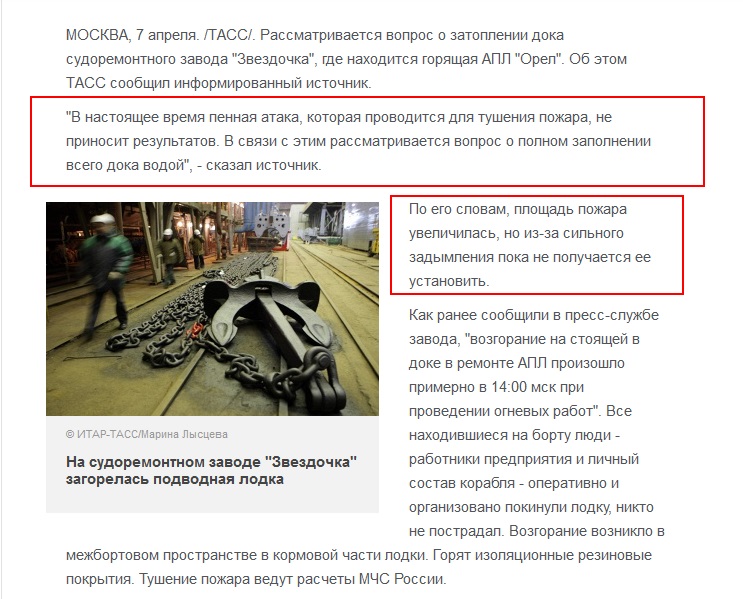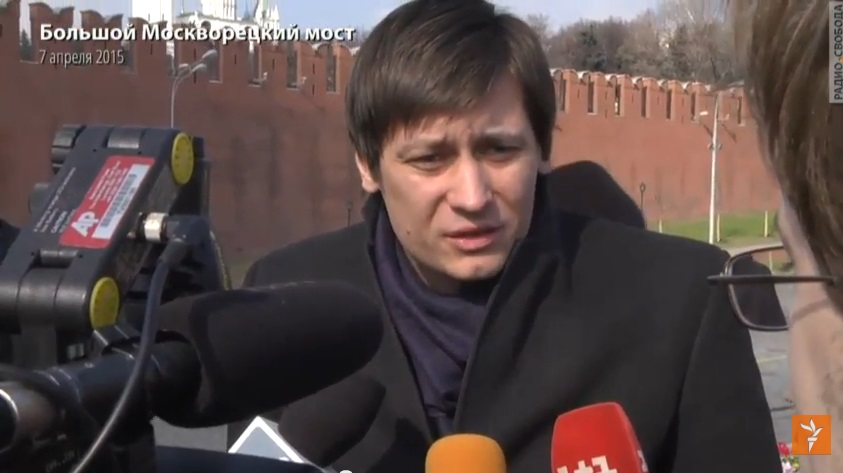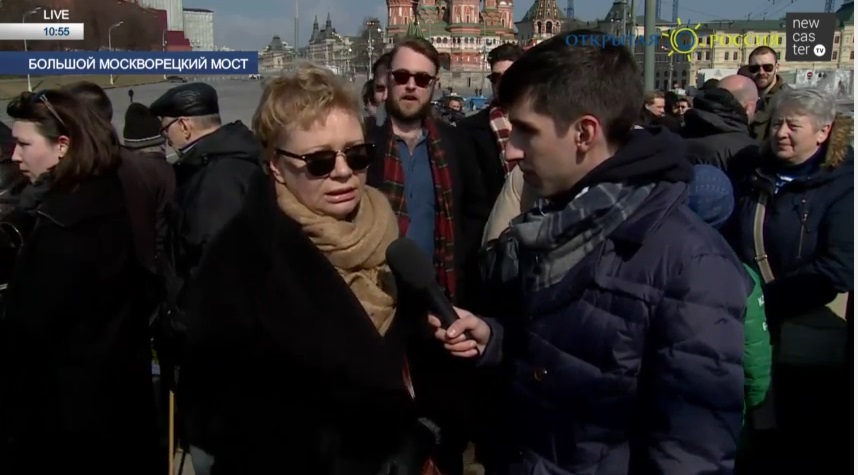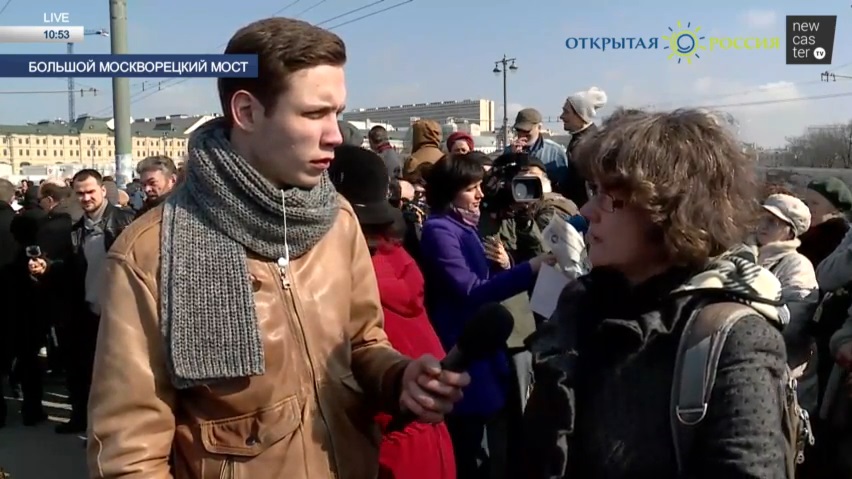Welcome to our column, Russia Update, where we will be closely following day-to-day developments in Russia, including the Russian government’s foreign and domestic policies.
The previous issue is here.
Supporters gather to remember slain opposition leader Boris Nemtsov today in the Russian Orthodox tradition, 40 days after his death.
UPDATES BELOW
Russia This Week:
– What Happened to the Slow-Moving Coup?
– Can We Be Satisfied With the Theory That Kadyrov Killed Nemtsov?
– All The Strange Things Happening in Moscow
– Remembering Boris Nemtsov, Insider and Outsider (1959-2015)
Special features:
– Alexey Navalny On the Murder of Boris Nemtsov
–Theories about Possible Perpetrators of the Murder of Boris Nemtsov
–Novaya Gazeta Releases Sensational Kremlin Memo: ‘It is Seen as Correct to Initiate Annexation of Eastern Regions of Ukraine to Russia’
Please help The Interpreter to continue providing this valuable information service by making a donation towards our costsâ€.
TV Rain held a telethon all day and evening to commemorate Boris Nemtsov, the former first deputy prime minister and opposition leader assassinated on February 27,2015.
Originally, the producers had hoped to hold a concert and readings but they were unable to find any venue to agree to rent space to them an event related to Nemtsov, so in the end, they broadcast musicians live from a factory building, and also held a program with some of the major opposition leaders and journalists who worked with Nemtsov including Alexey Venediktov, Sergei Parkhemenko, Alexey Navalny and others. Mikhail Khodorkovsky and Garri Kasparov were brought into the program by Skype because they are unable to travel to Russia.
The young TV Rain producers asked their guests, mainly people in their 40s-60s, how to understand the meaning of Nemtsov’s life and death, and what to explain to their children in the next generation. Some speakers pointed out that there had been a wave of assassinations that began with TV producer Vladimir Listyev in 1995 and continued with figures such as Galina Starovoitova and Yury Shchikhochikin, members of parliament, but then there had been relative “stability” ( yet Natalya Estimirova, Stanislav Markelev and Anastasia Baburova were killed in 2009).
All the speakers recalled how charismatic Nemtsov was, and what a “doer” he was when others were “talkers.” A number mentioned heated debates and even fights had with him for hours where they might even insult each other, yet they remain friends and colleagues. When Russian intelligence hacked his cell phone and released conversations via LifeNews, the purpose was to anger and divide the opposition, but it failed to affect people because Nemtsov was already open about what he thought so they didn’t mind.
The murder of Nemtsov, who was once a governor and deputy premier in the Kremlin, seemed to cross the line for many, and they wondered if such reprisals would end there.
Writer Vladimir Voinovich commented (translation by The Interpreter):
“I’m afraid it won’t end with that. When they say, by the way, a shot at Nemtsov is a shot at Russia, I think that’s not an exaggeration. Because in fact all these shots are done so that an enormous number of people will become fearful and misinformed, therefore civil society is not possible here, there is no serious public opinion, there is only the two-headed eagle with the one wing which waves [the Russian state symbol–The Interpreter]. We have an opposition which is abundantly represented here but it cannot compete with the state in strength. And it should be, in society, these forces should be equal, the state and the opposition forces.“
Yevgeniya Albats, editor of Novoye Vremya (New Times) commented:
He and I once met where he was living in a Moscow suburb and we must have gone 25 rounds bashing things and we discussed when would this regime begin to kill people, who will they start with, what will happen with Alyoshka [Alexey Navalny]. My last conversation with him was on the air on Ekho Moskvy, and after the show, I said, ‘Bor’ [Boris], you’re getting carried away. Look what you’re writing in Facebook. Surely you know Putin’s entourage doesn’t forgive personal attacks on Putin. You’ve become excessively sharp.’
I asked him, ‘Here, explain it to me. Alyosha Navalny, soon, he’ll just go out and take a piss and they’ll arrest him for that.’ It was endless. We saw what was happening to Navalny. ‘So why do they put up with that from you?’
And he replied, ‘You know, I was vice premier. So it was bad form, I seemingly belong to that new Russian nomenklatura. So it would be considered bad form to touch me. They won’t kill me so as not to commit a precedent.
And then five days later, they created that precedent. There is no framework, there are no rules, there are no flags. I believe that of course, the murder of Boris is a kind of watershed. They crossed the line that before they tried not to cross because Boris belonged…don’t forget he was first governor of Nizhny Novgorod, a successful region, until 1998, a potential successor to Boris Nikolayevich Yeltsin, a minister of oil and gas, first deputy premier…
Others noted that Nemtsov had once said, “I was Putin’s boss. I allocated apartments to FSB agents. I was part of the system So nothing can happen to me.” He was part of the Soviet and Russian nomenklatura, or privileged government elite.
Ilya Yashin, Nemtsov’s co-chairman in the RPR-Parnas party, said his experiences with Nemtsov was “an adventure.” He recalled the time they went to the city of Sochi to campaign for a seat in the local legislature for Nemtsov.
It showed all the non-typical nature of Nemtsov. To go for two months to another city. Nothing was to be understood there. Some United Russia people, some police, incomprehensible, intelligence agents, Nashisty [Nashi, government-created youth movement–The Interpreter] splashed his face with ammonia, I couldn’t understand how anything could come of this, with the total isolation which Kasparov mentioned.
He just went and shook several thousand people’s hands, and people simply went and voted for him. He went to the market, he talked to people. He went to an Armenian wedding, he went to meetings with teachers, with janitors, with anybody. Nemtsov was prepared to talk to anyone who was prepared to listen to him. He was absolutely incomprehensible to those people in the Kremlin. He didn’t travel with a body guard. He had a metro pass. He was a man who was absolutely open and sincere and incredibly brave. He had an absolute firm conviction that he wouldn’t ever die.
Mikhail Khodorkovsky, exiled Russian businessman and founder of Open Russia commented:
I hope we will all live to see the day when the history textbooks will speak the truth about such people as Nemtsov. And the truth will consist of the fact that he was a man who was difficult, complicated, a man of his time but with completely iron-clad convictions, insisting on the position that the country should be open, that there should be democracy in the country, that the government should be open.
And he was a man who, to the extent he was able, defended his convictions, and in the final analysis, tried to achieve from the government openness of the processes going on in the country. And in the opposition, he paid for that openness, for his positions, with his own life. I agree with Yevgeniya Albats and Alexey Navalny that we see here a watershed, in what happened to Boris. And likely in the history textbooks it will be written that at this moment, the country passed the last line separating it from heavy civic opposition.
(Note: The Interpreter is a project of the Institute for Modern Russia funded by Pavel Khodorkovsky.)
— Catherine A. Fitzpatrick
In the last few days, 7 Russian citziens have been detained in the Turkish province of Gaziantep as they illeggally attempted to cross the border to Syria, Lenta.ru reported, citing RIA Novosti.
Two citizens of Russia were detained on April 4 as they attempted to cross the border with Syria with the purpose of taking part in armed conflict. They have been turned over to law-enforcement agencies for their further deportation. On April 7, another 5 Russian citizens were detained on the border.
No names were provided and as both of these news services are controlled by the Russian state, the information is not verified.
Authorities in Gaziantep are quoted as saying that 59 Russian citizens have been detained since the start of the conflict in Syria in June 2011.
Sergei Melikov, presidential representative in the North Caucasus Federal District gave a figure of 1,500 Russian citizens reportedly fighting with ISIS on May 26.
He characterized their threat as “very serious” if they return to the North Caucasus, although he said their return was “made difficult.” Said Melikov (translation by The Interpreter):
The actions of the so-called ‘Islamic State’ has nothing in common with Islam, and is condemned by the whole Islamic community. Today they are already positioning their pretentions to a large territory from Portugal to the Volga Region, China, North Africa and a number of island states. The threat is great for the whole world.
This figure of Russian citizens fighting with ISIS was given as 1,700 on February 20 by Aleksandr Bortnikov during a recent conference at the White House, Countering Extremism, in which he took part as head of the Russian delegation. It is not known why a lesser estimate is now given a month later.
Various sources indicate that there are Chechens and other Muslims from the North Caucasus fighting in Syria. But it is difficult to assess because little information about the details of the cases is provided.
On March 26, the Turkish newspaper Daily Sabah distributed a statement by the government of the Turkish province of Gaziantep which said that on March 25, 4 foreigners were stopped as they attempted to cross the Turkish-Syrian border — 3 citizens of Saudia Arabia and one Russian citizen (according to the newspaper’s information, he had already been deported back to Russia). The newspaper noted that Turkey had detained about 60 Islamists from Russia over 4 years, 27 of them had been accused of participation in a terrorist organization, and administrative proceedings had been started regarding 32 others.
Recently, law-enforcers shot dead Shakhban Gasanov, 25, a suspected Islamist militant was shot dead by law-enforcers in an apartment building in Makhachkala when he refused to surrender. Earlier, he had served 2 years in jail after being detained on suspicion of ties to the terrorist underground in Dagestan. There have been some 300 cases of killing of suspects in the last year.
— Catherine A. Fitzpatrick
Fire-fighters are now flooding the dock where the Oryol nuclear submarine caught fire today as the foam attack isn’t working, TASS reported at 18:01 Moscow time.
An “informed source” told TASS (translation by The Interpreter):
“At the present time, the foam attack which was conducted to douse the fire is not bringing results. In that connection the issue is being reviewed of completely flooding the whole dock with water.“
He said the area involved in the fire has increased, but it is hard to establish the dimensions due to heavy smoke.
But at 18:43, this version of the report was deleted, and substituted with another quote from a source:
“The gates of the dock are open, the operation to flood it with water has begun. As a result the submarine Oryol will be submerged, which will enable us at first to localize and then liquidate the fire. There are no other means of dousing the fire on the submarine.”

Previous version of TASS report mentioning foam, now deleted.
Earlier Yevgeny Gladyshev, representative of the ship repair company’s press office said preparatory work had begun to flood the dock chambers, construction scaffolding was being removed, the gates were being closed and firemen were leaving the dock.
“How much the dock will be flooded with water is hard to say since the source of the conflagration is in the lower part of the submarine’s hull,” he said. He also noted that no nuclear fuel was loaded on to the submarine.
In the earlier version of the TASS report, Gladyshev was quoted as saying that 11 units
of the Emergencies Ministry had responded but the fire was not yet
under control.
The fire took place at the Zvezdochka ship repair shop in Severodvinsk, Arkhangelsk Region at 14:00 Moscow time. The personnel all evacuated the submarine without injury. The fire is in rubber insulation.
As expected, opposition deputy Ilya Ponomarev has been stripped of his parliamentary immunity, enabling Russian authorities to prosecute him on fraud charges, Novaya Gazeta reports.
Ponomarev has denied any wrongdoing in receiving fees for investment seminars that were once approved by the Russian government’s innovation project, the Skolkovo Foundation. (For more details on his case, see our report yesterday.)
Dmitry Gudkov, another opposition MP said the vote was overwhelmingly in favor of removal of Ponomarev’s immunity (translation by The Interpreter):
“I was the only vote against. I have the [voting] card of Ilya himself, and I pressed ‘abstain’ on it, that was most correct, Ilya is not offended at me. There were two others who abstained: Valery Zubov and Sergei Petrov. All the rest were ‘for’ as far as I could tell – 446-445.”
Ponomarev himself was the only “no” vote on the proposition to annex the Ukraine last March, which has earned him endless vilification in the Russian state media and social media.
Ponomarev called the move to strip him of immunity, “yet another episode of lawlessnes, predicted and not unexpected,” said Novaya Gazeta. He said the charges against him are “absurd.” Originally, he had planned to return to Russia in May, but now this will depend on how the criminal case will develop.
“Now he should definitely not return to Russia, it is not worth exposing himself,” said Gudkov.
— Catherine A. Fitzpatrick
There was a fire aboard a Russian nuclear submarine at the Zvezdochka ship repair shop in Arkhangelsk Region, krymr.com and TASS reported.
Law-enforcement sources said that the rubber insulation between light and strong boat hulls caught fire following some welding work. About 20 square meters are involved in the fire, says RIA Novosti.
The boat is in dry dock and fire-fighters continued to douse the flames for two hours, managing to localize the fire, said the sources.
“To a large extent, it’s just the rubber smoking there,” said a source.
The nuclear reactor was suspended before the fire and there was no ammunition on it, said a source. Some of the crew were on the submarine when the fire broke out but there have been no injuries.
According to preliminary reports, a violation of safety procedure was the cause of the fire. The submarine was being remodeled in order to be fitted with a new missile system.
A representative of the repair shop said she “could not confirm or deny” the fire.
The head of the technical department of the Russian Navy command has flown to Severodinsk to investigate the reasons for the fire, said TASS.
— Catherine A. Fitzpatrick
Several hundred supporters of slain opposition leader Boris Nemtsov came to mark the 40th days since his death, in the Russian Orthodox tradition.
They assembled on the Bolshoi Moskvoretsky Bridge where Nemtsov was murdered, just steps away from the Kremlin.
Mourners brought votive candles, Russian flags, flowers and home-made signs with the word “Boris’!” – a play on words which means both “Fight!” and the name “Boris.” Some people recited poetry. At 11:00 am Moscow time, cars driving by honked their horns, as organizers had requested them to do in a social media campaign to remember Nemtsov.
Police set up barriers along the walkway on the bridge but so far the event has proceeded peacefully with no problems.
Opposition Duma deputy Dmitry Gudkov told RFE/RL that in these 40 days, the authorities had not found the contractors or masterminds behind the murder, having only arrested perpetrators who have in fact retracted their testimonies saying they were given under torture.

Gudkov noted that while local legislatures in Yaroslavl, where Boris had been elected from the RPR-Parnas Party, and Krasnoyarsk devoted a minute of silence in his memory, the leadership of the national State Duma refused to observe such a moment.
The State Duma also refused to start a parliamentary inquiry into the murder, said Gudkov.
“Unfortunately, there is no political will,” he said.
Journalist Kseniya Larina, interviewed by Open Russia, said that she was still in shock and struggling every day with the memory of Nemtsov’s last interview at her radio station, Ekho Moskvy, where he spoke just hours before he was killed.

She had asked him whether it was appropriate to have such cheery graphics and a spring-like theme in the opposition’s original march planned for March 1, given that there was a war in Ukraine and people were dying, and when there was such a crisis in Russia.
“You can’t gather people for a wake,” he told her at the time — and yet the irony is that the opposition was then forced to turn their “Spring” demonstration into a memorial march.
She said the best way to remember Nemtsov was to help bring about the changes in Russia which he himself sought.
A psychologist who supported Nemtsov said it was hard to come to terms with his death, people felt confused, and the strange thing was that they needed someone to come and tell them what to do at a time like this — and Boris would have been that person.

Note: Open Russia is a project of Mikhail Khodorkovsky. The Interpreter is a project of Institute for Modern Russia, supported by Pavel Khodorkovsky.
— Catherine A. Fitzpatrick
In a move that has serious repercussions for user data privacy, the US companies eBay and PayPal have reportedly agreed to place the account information of their Russian customers on servers on Russian soil, Kommersant and Grani.ru report.
According to Kommersant, eBay is the first US Internet company to comply with a Russian law passed last year to go into effect September 1, requiring all Internet service providers to keep Russian customer data on servers on Russian territory, which makes it accessible to the Federal Security Service and other law-enforcers which are known for frequent human rights violations.
A formal announcement has not been made, but according to a source, Vladimir Dolgov, Russian representative of eBay, recently met with Antonina Prezhaya, the deputy head of Roskomnadzor, the state media monitoring agency that serves as a censor. eBay is moving all the data currently held in Switzerland to Russia. PayPal, a company owned by eBay will follow suit.
So far eBay has not specified what volume of data will be transferred and whether it will use its own servers in Russia or rent others.
According to iKS-Consulting, the Russian market for commercial data centers grew 28% in 2013 to 9.1 billion rubles ($165 million), and there are more than 170 large data centers in Russia. PayPal’s Galina Skatinkina said, “We will analyze the demands applicable to us and communicate with our regulators to work out the optimal decision.”
Perhaps because these companies are oriented toward business and retail, and not communications and alternative media in the same way as Facebook, Twitter and other companies, they may not feel as if making customer data available to the whims of the FSB will be so terrible. The alternative was not to have any business at all, and platforms that help small business and individuals re-sell second-hand goods are going to be appreciated more than ever in Russia in the current economic crisis.
PayPal opened in Russia in 2013, but in 2014, with the imposition of sanctions, there were reports that Russia wasn’t always accepting payments but other users insist that it is working.
It is not known yet how Facebook, Twitter, Google and other social media providers with significant Russian usage will address the challenges of this law. They have been in talks with Russian officials.
— Catherine A. Fitzpatrick
Today is the 40th day since the death of opposition leader Boris Nemtsov, a day commemorated in the Russian Orthodox tradition.
Nemtsov was assassinated on the night of February 27 on the Bolshoi Moskvoretsky Bridge a 100 meters from the Kremlin’s walls. Five Chechens have been arrested in the murder but the contractor and masterminds have not been identified and the suspects say they confessed under torture.
— Catherine A. Fitzpatrick